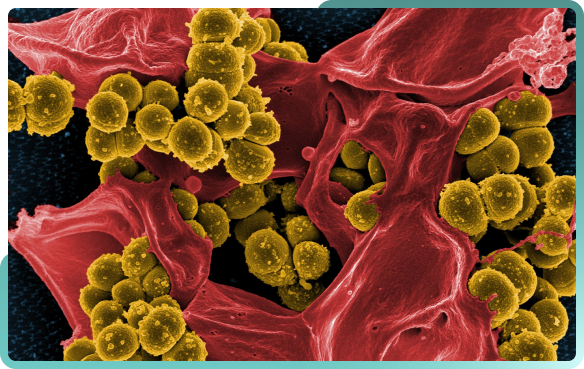MRSA Treatment
Methicillin-Resistant Staphylococcus Aureus (MRSA) is a multi drug-resistant bacteria. MRSA is similar to Staphylococcus Aureus (also known as staph”), a bacterium many of us carry on our skin. In fact, staph colonized about 30% of the population meaning that bacteria are present on the skin but do not cause infections. MRSA is a type of Staph that has become resistant to the common antibiotics we use to treat staph infections (penicillin, amoxicillin and ampicillin). So, when MRSA breaks through the skin and causes an infection, the infection can be difficult to treat.
MRSA infections tend to last longer, cost more money to treat and cause recurrent infections over time. MRSA infections used to occur only in hospital settings or long-term care facilities, but over the part 20 years, MRSA have become much more common in the community setting.

Preventing MRSA Infections
The best way to avoid staph infections of any kind is through good prevention:
- Good hand hygiene by washing your hands for at least 20 seconds with soap and warm water.
- Keep cuts and scrapes bandaged until they heal over.
- Avoid sharing personal items like razors, towels, or gym equipment.
Diagnosing a MRSA Infection
It is impossible to determine if MRSA has caused an infection by your physical exam alone. But, there are clues we use to make the final determination. The biggest clue is if a mild infection has not improved or has worsened while a patient is taking appropriate antibiotics. Also, the location of the infection can be a key as all staph bacteria like moist locations (underarms, groin). In some instances, when patients have a weakened immune system, MRSA can move beyond the skin and cause infections in other organs. If necessary, we can perform a “wound culture” where we examine what type of bacterium is causing the infection. We can also see what (if any) antibiotics toward which the bacterium shows resistance.
Treating MRSA
The treatment of MRSA can be quite diverse. If the infection is mild, we can treat it with oral antibiotics. We use a combination of antibiotics—one that treats staph very well and another that targets MRSA. If there is an abscess or “pus pocket” then we must drain it for the infection to heal. If the infection is severe, or if a patient is not improving on routine antibiotics, ContinuEM has many IV medications to target MRSA. Repeat doses of IV antibiotics may be necessary to control the infection
If you have an infected open wound that your doctors suspects may to be from staph or MRSA, you can continue your normal activities. Always be sure to keep it covered with a clean bandage AND continue to practice good hand hygiene.
We’ve Got You Covered
Our goal is to provide urgent medical care to anyone in the area in their time of need at a cost that is right for them.
Insurance & Pricing
